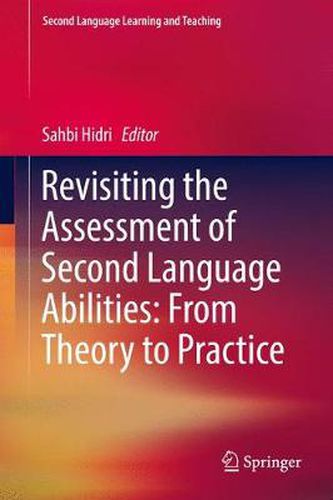Readings Newsletter
Become a Readings Member to make your shopping experience even easier.
Sign in or sign up for free!
You’re not far away from qualifying for FREE standard shipping within Australia
You’ve qualified for FREE standard shipping within Australia
The cart is loading…






This title is printed to order. This book may have been self-published. If so, we cannot guarantee the quality of the content. In the main most books will have gone through the editing process however some may not. We therefore suggest that you be aware of this before ordering this book. If in doubt check either the author or publisher’s details as we are unable to accept any returns unless they are faulty. Please contact us if you have any questions.
This book presents an overview of revisiting the assessment of language abilities. It also showcases how the measurement of such constructs can result in negative or positive washback and how outcomes might be conducive to repercussions that decide on the future of many stakeholders. The 23 chapters were selected among tens of chapters received from different contexts that addressed the issue of revisiting the assessment of language abilities, such as Tunisia, Ukraine, Algeria, Russia, KSA, Sudan, Egypt, Canada, Kurdistan, UK, USA, Iran, Turkey, etc. These contexts have highlighted the necessity to revisit the different constructs which should be assessed with a clear and straightforward foundation on students’ learning objectives and their actual language ability. To do so, most of the chapters present hands-on use of relevant statistical tests that might serve in revisiting the construct definition both theoretically and operationally. Perhaps the sole and intricate question that the authors of these contributions ask is what it means to revisit the assessment of the construct of individualized language ability and how. In addition, the book accentuates the momentousness and significance of reflecting on test fairness and validation as the mainspring and backbone for democratization of assessment. This book appeals to a broad readership, such as English Language Teaching (ELT) practitioners, language teachers, students, testing organizations, policy-makers, test designers, writers of test specifications, testing experts, researchers, program evaluators, especially in the Middle East and North Africa (MENA) as well as other international contexts.
$9.00 standard shipping within Australia
FREE standard shipping within Australia for orders over $100.00
Express & International shipping calculated at checkout
This title is printed to order. This book may have been self-published. If so, we cannot guarantee the quality of the content. In the main most books will have gone through the editing process however some may not. We therefore suggest that you be aware of this before ordering this book. If in doubt check either the author or publisher’s details as we are unable to accept any returns unless they are faulty. Please contact us if you have any questions.
This book presents an overview of revisiting the assessment of language abilities. It also showcases how the measurement of such constructs can result in negative or positive washback and how outcomes might be conducive to repercussions that decide on the future of many stakeholders. The 23 chapters were selected among tens of chapters received from different contexts that addressed the issue of revisiting the assessment of language abilities, such as Tunisia, Ukraine, Algeria, Russia, KSA, Sudan, Egypt, Canada, Kurdistan, UK, USA, Iran, Turkey, etc. These contexts have highlighted the necessity to revisit the different constructs which should be assessed with a clear and straightforward foundation on students’ learning objectives and their actual language ability. To do so, most of the chapters present hands-on use of relevant statistical tests that might serve in revisiting the construct definition both theoretically and operationally. Perhaps the sole and intricate question that the authors of these contributions ask is what it means to revisit the assessment of the construct of individualized language ability and how. In addition, the book accentuates the momentousness and significance of reflecting on test fairness and validation as the mainspring and backbone for democratization of assessment. This book appeals to a broad readership, such as English Language Teaching (ELT) practitioners, language teachers, students, testing organizations, policy-makers, test designers, writers of test specifications, testing experts, researchers, program evaluators, especially in the Middle East and North Africa (MENA) as well as other international contexts.